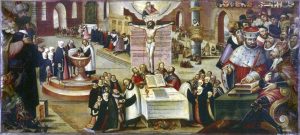“Everything depends on these words. Every Christian should and must know them and hold them fast. He must never let anyone take away from him by any other kind of teaching, even though it were an angel from heaven [Gal. 1:8]. They are the words of life and salvation, so that whoever believes in them has all his sins forgiven through that faith; he is a child of life and has overcome death and hell. Language cannot express how great and mighty these words are, for they are the sum and substance of the whole gospel.“*
Martin Luther published these words in late April 1523 in his treatise to the Bohemian Brethren entitled, The Adoration of the Sacrament. Luther wrote to respond to this group’s teaching on the Lord’s Supper and how Christians should adore the sacrament in the divine service. In the first part, Luther wrote about the nature of the Lord’s Supper. He put forth one of his first published arguments against those who wanted to interpret the Sacrament as only symbolic. In so doing he rested his theological position on Christ’s Words of Institution, or the words upon which everything depends. He explained:
” In the first place, we have often said that the chief and foremost thing in the sacrament is the word of Christ, when he says, ‘Take and eat, this is my body which is given for you.’ Likewise also, when he took the cup, he said, ‘Take and drink of it, all of you, this is a cup of a new testament in my blood which is shed for you for the forgiveness of sins. As often as you do this, do it in remembrance of me.’ “**
Later in the same work he explicitly rejected a symbolic interpretation of these words. However, he emphasized that FAITH in Christ’s promise in these Words was inner means to properly adore Christ in the Sacrament. Luther exhorted his readers to trust God’s Words by stating, “But we should and will simply stick to the words of Christ—he will not deceive us—and repel this error with no other sword than the fact that Christ does not say: ‘This signifies my body,’ but ‘This is my body.’ ”***
*Martin Luther, The Adoration of the Sacrament, Luther’s Works, vol. 36, p. 277. [Emphasis added]
**Ibid. [Italics in the original.]
***Ibid., pp. 279-80.

